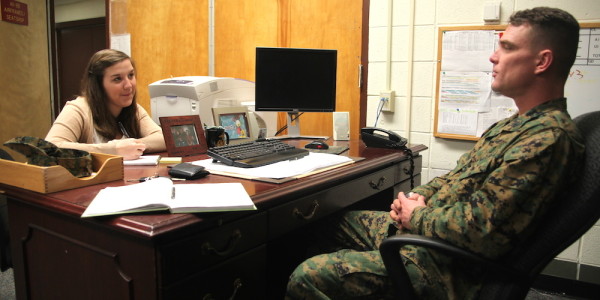

Editor’s Note: This article originally appeared on Hirepurpose’s Career Compass, a virtual library of the advice, guidance, and tips you need to find success in your civilian career.
There are two good reasons to ask questions during an interview: It demonstrates your intelligence, ambition, and knowledge of the company, and, just as importantly, it ensures that you’re interviewing for the right job at the right company.
Virtually all job interviews will have a point when you will be asked, “Do you have any questions for me?” If the interview ends and you’re never given the chance to ask questions, you could simply ask, “May I ask you some questions?”
From there your line of questioning should aim to achieve three kinds of larger goals.
- Make you look better as a candidate.
- Show your interest in the company and position.
- Ensure the job is the right one for you.
We’ll give you 3-4 questions from each group, which should be more than enough to cover you on most job interviews. And remember, it is okay to write down the questions you want to ask before the interview, and to pull out a tablet or notepad to reference when the time comes. This demonstrates that you prepared before walking into that room.
Look better as a candidate.
What kind of skills and experiences does your ideal candidate posses?This will allow you to hear what the company is looking for and then connect your background and skills back to those qualities.
Do you have any reservations about my skills or experience?A bold follow-up question that will show you’re not afraid to face questions about yourself. Listen to what the answers are, and then a good follow up might be, “Are there ways that these could be addressed through continuing education or professional training within the company?”
How would you define success for this role?Show them that you’re goal-oriented, and that you want to know exactly what it means to do your job well.
Do you have any questions about my military experience?For civilians, they may not fully understand what life in the military is like. This will allow the interviewer to ask any questions they feel can help them better understand you and your role with the military.
Show your interest in the company and position.
What can you tell me about this team?Being team focused is critical for most jobs. This question helps the interviewer see that you are already thinking about the job as a team endeavor, not a solo project.
How does this job impact the larger scope and mission of the company?This is also designed to show that you’re thinking in bigger terms than a paycheck. By expressing curiosity about the company as a whole, and your place in it, you demonstrate that you will be able to perform your job while working toward a larger goal.
What is the single most important part of this job?Be sure to listen carefully to the answer. If your skills and experience don’t traditionally seem tailored to the response, be sure to address it head on.
Ensure the job is the right one for you.
What are the expectations around this position? This question will help you understand how much work you will be expected to do, what kinds of things you’ll need to deliver, and how many hours you may need to work. Salaried jobs, for instance, often have an expectation that you will get your work done regardless of how long it takes, while hourly positions have an expectation you will work efficiently.
What kinds of challenges do you think the person in this position faces?This answer is really for you. If you hear, “Well, we’ve been understaffed for six months, so the biggest challenge is meeting your deadlines,” you should ask for more information. Ask if they plan to hire more people, and if not, what other tools or options you’d have. Or if they were to say something like, “Burnout is a real problem,” you would want to dig a little deeper, such as, “How do you think people could prevent burnout in this position?”
Do you enjoy your job?This is a clever question that will give you a sense of whether this person likes his or her job, and the company. It also demonstrates empathy, meaning you are taking the time to consider the job from the perspective of someone in a very different position. Listen carefully to the response, because it can tell you a lot about the company’s culture.
The single most important thing to remember on any interview is to be curious. While all of us are grateful to get work, most of us have experience being the wrong person for the job. With some skillful and careful questions, you can ensure that your dream job turns out to be just that.